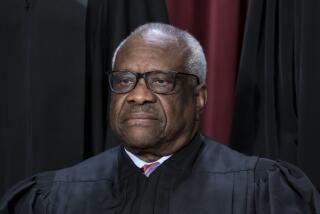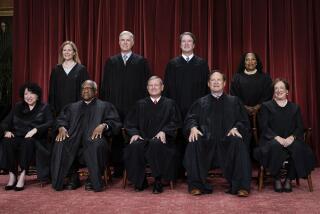Senate Committee Widens Campaign Finance Probe
- Share via
WASHINGTON — Senate investigators have broadened their search for potential influence-peddling in the Clinton administration, issuing a subpoena for White House records on controversies ranging from a coal-rich national monument in Utah to a proposed Indian casino in Wisconsin to a shrimp cocktail buffet in Guam for First Lady Hillary Rodham Clinton.
The chairman of the Senate committee investigating campaign finance abuses, Fred Thompson (R-Tenn.), issued the subpoena late last month after Democrats and Republicans on the panel complained of White House stalling under a voluntary arrangement to provide documents.
A copy of the subpoena was obtained by the Washington Post. It suggests that the committee intends to expand its scope considerably when Congress returns from its August recess.
The White House declined to comment on the particulars of the subpoena.
The demand for records about Hillary Rodham Clinton’s Sept. 4, 1995, visit to Guam was one of several concerning the American territory. For the last 10 years, officials in Guam have been asking for a law that would give its officials more authority over immigration, taxes, trade, labor laws and federal land.
Three weeks after the first lady’s visit, capped by a buffet hosted by the island’s governor, Carl T. Gutierrez, a Guam Democratic Party official turned up in Washington with more than $250,000 in campaign contributions. Within six months, Gutierrez and a small group of Guam businessmen had contributed a total of $132,000 to the Clinton-Gore campaign and $510,000 in “soft money” to the Democratic National Committee.
The donations were followed by an administration proposal, since shelved, to support key provisions of the proposed Guam Commonwealth Act, a marked shift from the stance of previous administrations.
The controversy over the coal-rich 1.7-million-acre Grand Staircase-Escalante National Monument has been bubbling since last September when President Clinton set aside the Utah canyon lands.
The surprise election-year move was applauded by environmentalists but drew opposition from Utah officials who said it would block a Dutch company’s planned development of a mine with clean-coal deposits valued by some at $1 trillion.
Creation of the monument prompted allegations that it was designed to boost the value of similarly rich coal fields in Indonesia as a reward to the Lippo Group for its campaign contributions. So far, no such connection has been shown.
The off-reservation gambling casino proposed by three Wisconsin Chippewa tribes was scuttled by the Interior Department in mid-1995 after an intense lobbying effort by seven opposing Minnesota and Wisconsin tribes who gave a total of $321,000 to the national Democratic Party and Minnesota’s Democratic Farmer-Labor Party.
More to Read
Get the L.A. Times Politics newsletter
Deeply reported insights into legislation, politics and policy from Sacramento, Washington and beyond. In your inbox twice per week.
You may occasionally receive promotional content from the Los Angeles Times.










